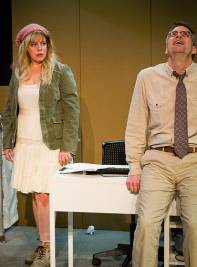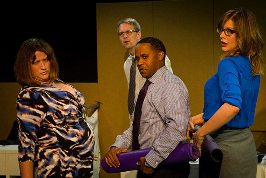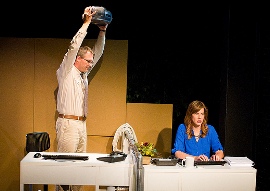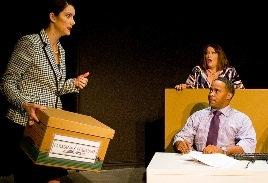
Have you ever felt so unnoticed by those around you that you said to yourself, “I might as well be invisible.” Well, that’s exactly how office worker Colin feels in Alex Dremann’s existential romantic comedy The Invisible Play (aka THE :NV:S:BLE PLAY), and though T:P could have benefited from some tightening and sharpening before making its West Coast Premiere, it proves a terrific acting showcase for Criminal Minds’ Kirsten Vangsness and her fellow company members at Hollywood’s Theatre of NOTE.
 While most employees at Fahrmann & Fahrmann Existential Books, the New York City publishing house responsible for such tomes as Existential Yoga and Existential Bacon, live in fear of being the next one laid off by mean boss Nancy (Gina Garcia Sharp), wallflower Colin (Trevor H. Olsen) struggles simply to get his gossipy, chummy coworkers—Tim (Norm Johnson), Carmen (Wendi West), Cass (Joel Scher, hidden behind a partition), and Fran (Jennifer Flack)—to realize he’s actually sitting there in the cubicle between Tim’s and Fran’s, though in the case of drop-dead gorgeous Fran, it probably wouldn’t matter if she did notice Colin since she’s already married anyway. Then again, maybe she’s not so married anymore if office scuttlebutt is to be believed.
While most employees at Fahrmann & Fahrmann Existential Books, the New York City publishing house responsible for such tomes as Existential Yoga and Existential Bacon, live in fear of being the next one laid off by mean boss Nancy (Gina Garcia Sharp), wallflower Colin (Trevor H. Olsen) struggles simply to get his gossipy, chummy coworkers—Tim (Norm Johnson), Carmen (Wendi West), Cass (Joel Scher, hidden behind a partition), and Fran (Jennifer Flack)—to realize he’s actually sitting there in the cubicle between Tim’s and Fran’s, though in the case of drop-dead gorgeous Fran, it probably wouldn’t matter if she did notice Colin since she’s already married anyway. Then again, maybe she’s not so married anymore if office scuttlebutt is to be believed.
 Things begin to change for our nebbishy hero, though not necessarily for the better, when one evening after all the office staff have departed for home, he makes the acquaintance of Ramona (Vangness), whom he’s certain he’s meeting for the very first time despite her assurances that she does indeed work for Fahrmann & Fahrmann, her duties primarily centered around office plant care. Ramona’s revelation that she is asexual (insistence might be a better way to put it) pales in comparison to the bombshell she soon drops. After years of virtual invisibility at work, Ramona has become quite literally invisible, and so has fellow employee Lawrence (voice of Christopher Neiman), and quite a few other “invisibles” around them. (When Colin wonders why he can see and hear Ramona but only hear Lawrence, Ramona explains that there are degrees of invisibility. Who knew?)
Things begin to change for our nebbishy hero, though not necessarily for the better, when one evening after all the office staff have departed for home, he makes the acquaintance of Ramona (Vangness), whom he’s certain he’s meeting for the very first time despite her assurances that she does indeed work for Fahrmann & Fahrmann, her duties primarily centered around office plant care. Ramona’s revelation that she is asexual (insistence might be a better way to put it) pales in comparison to the bombshell she soon drops. After years of virtual invisibility at work, Ramona has become quite literally invisible, and so has fellow employee Lawrence (voice of Christopher Neiman), and quite a few other “invisibles” around them. (When Colin wonders why he can see and hear Ramona but only hear Lawrence, Ramona explains that there are degrees of invisibility. Who knew?)
 The following day, as his coworkers try out Existential Yoga (you just think the poses) with varying degrees of commitment and success, it gradually dawns on Colin that not only are they ignoring him as usual, he seems to have become 100% invisible—and inaudible to boot.
The following day, as his coworkers try out Existential Yoga (you just think the poses) with varying degrees of commitment and success, it gradually dawns on Colin that not only are they ignoring him as usual, he seems to have become 100% invisible—and inaudible to boot.
In fact, so thoroughly has Colin become nonexistent that Nancy can’t even recall that it was he who was editing the as yet only two-thirds completed Existential Romance, the latest novel by high-maintenance authoress Kitty (Scher again). And so Nancy assigns the editing task to Fran, who finds herself unable to convince the novelist to complete the final third by its rapidly approaching deadline.
Hearing of Fran’s conundrum (and with a little prompting from Ramona), Colin gets an idea. If he can a) write the final chapters himself, and b) somehow email those chapters to Fran, it might dawn on her that the man in the next cubicle is the Man Of Her Dreams and in so doing bring Colin back to visible, audible, and considerably more meaningful life. Unfortunately, Colin didn’t factor his current invisibility into the equation, leading to a bang-up pre-intermission fadeout as The Invisible Play’s first act fades to black.
 With a play as original as Dremann’s, direction as effervescent as Amanda Weier’s, and a cast as splendid as the one assembled at Theatre Of NOTE, The Invisible Play proves quite entertaining throughout, with a good deal of brain stimulation thrown in for good measure.
With a play as original as Dremann’s, direction as effervescent as Amanda Weier’s, and a cast as splendid as the one assembled at Theatre Of NOTE, The Invisible Play proves quite entertaining throughout, with a good deal of brain stimulation thrown in for good measure.
True, T:P could use some tweaking. Dremann sets up certain invisibility rules, then bends if not outright breaks them. How Colin can pick up a phone to leave a voice mail but then need Ramona’s help in turning off the lights is but one logic hole that could stand filling. Also, shouldn’t the objects Colin picks up be seen floating through space per long-established stage and film convention? On an unrelated note, how is it possible that Colin seems to have no recollection of a significant event that took place seven years ago between him and Fran? And shouldn’t Dremann give us some hint that Colin’s interest in Ramona might be turning less adversarial and more (shall we say) romantic? As for the play’s surprise coda, it’s funny indeed, but does it make any sense given the rules established early on?
These are issues that might have been addressed before The Invisible Play’s West Coast Premiere (following a considerably lower profile production earlier this year in Columbus, Ohio), particularly if Dremann wishes The Invisible Play to have post-L.A. legs.
 Still, for this reviewer at least, these quibbles prove relatively minor. I bought into the world Dremann has concocted, and with stellar lead performances by Olsen and Flack, and bang-up support by Vangsness in particular, I found it easy to fall under The Invisible Play’s existential spell. Olsen is one of those actors who can say as much with his face and eyes as he does with words. In fact, the more invisible Colin gets, the more watchable Olsen proves. (His Lloyd Dobler moment is a real gem.) Flack takes The Invisible Play’s best written, most complex character and plays Fran for all she’s worth, investing the role with poignancy and depth, in addition to the role’s requisite beauty.
Still, for this reviewer at least, these quibbles prove relatively minor. I bought into the world Dremann has concocted, and with stellar lead performances by Olsen and Flack, and bang-up support by Vangsness in particular, I found it easy to fall under The Invisible Play’s existential spell. Olsen is one of those actors who can say as much with his face and eyes as he does with words. In fact, the more invisible Colin gets, the more watchable Olsen proves. (His Lloyd Dobler moment is a real gem.) Flack takes The Invisible Play’s best written, most complex character and plays Fran for all she’s worth, investing the role with poignancy and depth, in addition to the role’s requisite beauty.
 As for Vangsness, not only is she a quirky delight as Ramona (and the main reason I bought the play’s ending despite insufficient script buildup), it says something about an actor’s dedication to craft when she is as committed to performing for peanuts in a blackbox theater as she is to her considerably more remunerative series regular role on CBS’s long-running Criminal Minds.
As for Vangsness, not only is she a quirky delight as Ramona (and the main reason I bought the play’s ending despite insufficient script buildup), it says something about an actor’s dedication to craft when she is as committed to performing for peanuts in a blackbox theater as she is to her considerably more remunerative series regular role on CBS’s long-running Criminal Minds.
 West plays her stock character with considerable flair, and where another production might have gone for a more predictable “young Ashton Kutcher” as office hottie Tim, it’s refreshing to see Johnson cast non-traditionally and playing the role with such pizzazz and sass. Sharp has her office shark down pat as well, and Neiman is so good as Lawrence, it’s a shame he’s heard and not seen. As for Scher, so fabulous in Eat The Runt three years ago, I say why not cast the ballsy, boozy Kitty genderblind when Scher plays her so well? On the other hand, I would like Scher to have differentiated between Kitty’s and Cass’s voices in more than just accent.
West plays her stock character with considerable flair, and where another production might have gone for a more predictable “young Ashton Kutcher” as office hottie Tim, it’s refreshing to see Johnson cast non-traditionally and playing the role with such pizzazz and sass. Sharp has her office shark down pat as well, and Neiman is so good as Lawrence, it’s a shame he’s heard and not seen. As for Scher, so fabulous in Eat The Runt three years ago, I say why not cast the ballsy, boozy Kitty genderblind when Scher plays her so well? On the other hand, I would like Scher to have differentiated between Kitty’s and Cass’s voices in more than just accent.
A reconfigured Theatre Of NOTE allows scenic designer Zack Guiler to create an office cubicle set that makes us feel as if we are flies on two of its walls. Lighting designer Ellen Monocroussos does her accustomed expert work, and never more so than in a scene that takes place in virtual darkness. Kimberly Freed’s character-appropriate costumes and Mark McClain Wilson’s zippy sound design (which features an entirely apropos “Nowhere Man”) are winners as well, as are Flack’s props and Gene Michael Barrera’s artwork design.
The Invisible Play is produced for Theatre Of NOTE by Brent Armstrong and Vangsness. Kelly Egan is stage manager.
Though not a flawless play, The Invisible Play is a very good one made even better by Olsen, Flack, and Vangsness. I found myself quickly drawn into its existential world, and enjoyed every second of the ride.
Theatre of NOTE, 1517 N. Cahuenga, Hollywood.
www.theatreofnote.com
–Steven Stanley
December 12, 2013
Photos: Neil Gutierrez
Tags: Alex Dremann, Kirsten Vangsness, Los Angeles Theater Review, Theatre Of NOTE


 Since 2007, Steven Stanley's StageSceneLA.com has spotlighted the best in Southern California theater via reviews, interviews, and its annual StageSceneLA Scenies.
Since 2007, Steven Stanley's StageSceneLA.com has spotlighted the best in Southern California theater via reviews, interviews, and its annual StageSceneLA Scenies.







 COPYRIGHT 2025 STEVEN STANLEY :: DESIGN BY
COPYRIGHT 2025 STEVEN STANLEY :: DESIGN BY